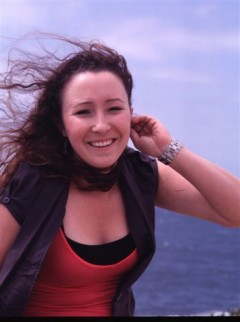
Drummer Ali Foster, the 2007 recipient of the Jann Rutherford Memorial Award, performs in Sydney later in the month, in a concert organised as part of her prize.
The award, named in honour of the late jazz pianist Jann Rutherford, was founded to assist in the professional development of outstanding young female Australian jazz musicians.
The 21-year-old, who is already a mentor to two young female drummers, spoke to Jazz Australia about the diversity of influences that inform her music and the importance of teamwork.
Jazz Australia: What attracted you to jazz and, more particularly to the drums?
Ali Foster: My dad was an old rocker on the drums in the ‘60s and my brother played the drums in a band in high school so we always had a drum kit around the house.
I started playing piano when I was five and did AMEB exams until grade 4 but when I realised I could play the drums, I began getting drum lessons instead of piano lessons in Year 8 at high school. I loved it and practised A LOT!
The high school big band was awesome at the time and so I asked my teacher to teach me how to play jazz drums so that I could audition for Hipnosis and then I did in Year 10 and got in. Then from there I wanted to get into the Sydney Con jazz course so kept at it.
JA: Are there any drummers who have particularly inspired you?
AF: I discovered the drummer Al Foster when I first started getting into jazz so that has always inspired me and I always loved Jimi Hendrix and loved that Mitch Mitchell was also a jazz drummer.
Evan Mannell from Sydney was also one of my first and continued inspirations. I love how he employs rock and funk into his jazz playing. The more recent inspirations have been from Philly Jo Jones and Ben Riley.
JA: What about other sources of musicial inspiration – here and overseas?
AF: I like rock in any form – progressive, punk or pop. My favourites are Muse, Silverchair, Paramore, Antiskeptic, the Killers. Also, recently I have been getting into Bjork, which is great.
JA: How would you describe your approach to music? I gather you mix jazz improv with elelments of blues, funk and rock?
AF: To me the drums add the most to the groove of the music. So I always do what I can to add to the feel of the song. I’m influenced by lots of different genres – progressive rock, blues, funk – so I hope that comes out in my jazz improv.
JA: What can audiences expect to hear at one of your gigs?
AF: There will be lots of originals – written by the boys – that have free, prog rock, funk and blues influences to them. There will also be a few standards arranged by me with weird twists to them.
JA: A decade or so ago young musicians might have been worried about whether what they were doing was really “jazz” or not. I get the impression that younger players these days are less concerned about labels. Would that be an accurate assessment?
AF: Definitely! We just play what we enjoy and what we think sounds awesome and if people ask ‘what sort of music is it?’ then I guess we would try to describe it to them. Labels don’t mean anything; I think they just help people to understand where the music is coming from. Jazz is fused with everything these days, so I guess it could be impossible to describe it sometimes.
JA: You mentor two young women drummers. What do you enjoy about teaching others and what are some of the key messages you want to impart about the process of music making?
AF: I love trying to spark a passion for music in young musicians or if the spark is already there I love trying to help them grow as musicians.
In a band, music making is about teamwork, so I always encourage students to think of what would add to the music not just what sounds cool on the drums. This involves listening and concentrating. I’m still, and always will be, learning how to concentrate and listen harder to others when I’m playing the drums so it’s definitely something I would stress to students.
The MOST important part of music making is to have fun. That’s something that is often forgotten in the jazz world. The reason we play music is because we enjoy it and we want other people to enjoy it. The reason we play jazz is to express ourselves through the music and take the audience on a journey where they can take what they want from the music.
JA: What are your plans after you finish your studies?
AF: After this year at uni I hope to teach drums one-to-one at a few schools and do gigs or sessions regularly. I also want to practise a lot more!
JA: How do you see your career progressing?
AF: I see myself playing for many different bands and line-ups in many different musical genres and hopefully being able to do recording sessions, too. And I’ll always be teaching.
The Ali Foster Quartet plays the Sound Lounge in Sydney on 29 February.
Find out more
Jann Rutherford Memorial Award














